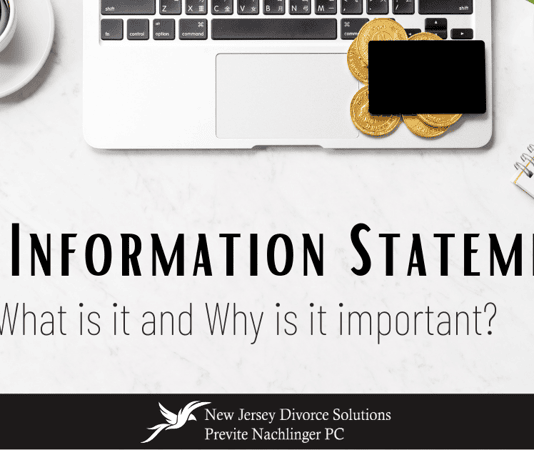Case Information Statement: What is it and Why is it important?

When you go through a divorce, you will likely encounter a document called the Case Information Statement, or “CIS.” Anytime you have to fill out a document can invoke stress and anxiety. So, what is a CIS, and why might your attorney call it the most crucial document that you will fill out in your divorce proceedings?
Let us start with what is a CIS. To put it simply, a CIS is a document that outlines all of your income, expenses, assets, and debt. It provides a snapshot of your financial circumstances today, as well as how you have spent your money over the past couple of years of your marriage. It is a document that you must sign under oath, and therefore, provides your spouse and his or her attorney something to hang their hat on when trying to resolve your case.
The first part of the CIS is your income. You will provide information from the last income tax return that you filed, including your gross income, your “unearned” income (like dividends and capital gains), as well as your three most recent paystubs. You will then come up with a “year to date” income based upon your most recent paystub. This income calculation is critical as it shows what your income is likely to be at the end of the year after you earn all of your income. You will answer a series of questions about bonuses, overtime, and raises, so that the court can get a full picture of your income, past, present, and future.
Next, you will do your budget. This is the part of the CIS that stresses people out the most. You will be tasked with coming up with your “marital lifestyle.” What does that mean? That means an “average” of how much you spent per month on every line item. There are three primary sections to the budget: Housing Expenses (called Schedule A), Automobile Expenses (called Schedule B), and Everything Else (called Schedule C). To come up with these figures, you will have to look at bank and credit card statements or make an educated guess. Your budget must look like reality. It does not make you look truthful when your monthly expenses are $7,000, but your net monthly income is only $5,000. Credibility is vital in any court action, and a CIS is no different.
Finally, you will list all of your assets and debt. The key is to put a value on each item and date the valuation date. For bank accounts, this means you will put the account balance and the date on which you looked at the balance. For real property, you might estimate and put the date on which you estimated. This is important as it is a disclosure of everything that you have. If you do not put everything that you have, whether you think your spouse is entitled to it or not, you can be guilty of misrepresentation. You do not want to do that! Let your attorney argue how things should be divided; you need to provide all of the information on everything that you have.
Now, why is a CIS important? This document will be filled out early in your case. It is the document that your spouse’s attorney will use to determine what information and documentation they need from you. If you misrepresent or do not fill out the CIS fully and correctly, you can make yourself look like a liar, and someone is trying to hide things from your spouse and the court. A fully complete and correct CIS is the foundation of the entire divorce process. It would be best if you treated it like the important document that it is.
In our office, we use EasySoft software to complete our CISs, because it allows a variety of functions to help us input information and help our clients. When you start a divorce, do yourself a favor and give the CIS your full attention. If you have any questions about case information statements or want help with your divorce, give our office a call at 732-384-1514.
"We won’t tell you what you want to hear. We will tell you what you need to know."
